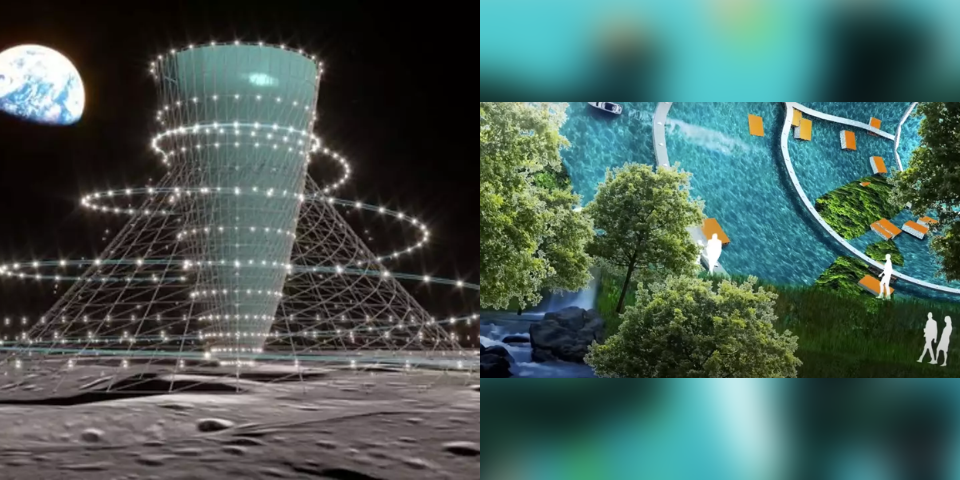Space travel has been something humanity has only ever dreamed about, with sci-fi media (games, books, movies) being as close as we’ve ever come to seeing concepts like space colonization and terraformation get fleshed out. But lately, there’s been plenty of real interest in actually sending humans beyond space for more than just research and national pride, with quite a few companies seriously pushing forward concepts and ideas for allowing humans to travel to and even live on celestial bodies other than our own planet. One novel concept put forth is a city on the Moon that will allow humans to live on Earth’s only natural satellite, with considerations even made for creating artificial gravity.
The team behind the concept hails from Kyoto University and the Kajima Corporation in Japan, with a joint proposal highlighting a three-phase approach for creating a sustainable and completely habitable environment for humans on the Moon. The most important factor in the design, of course, is the overcoming of low-gravity situations, which are hardly ideal for human physiologies over long periods of time. Research has proven that astronauts living in space for just a few months have demonstrated a decade’s worth of bone loss, with these effects often irreversible.
The concept for the lunar city, however, presents a solution to that problem by using centrifugal force to create artificial gravity. The Moon’s gravity measures in at only around 16. 5 percent of that on Earth, but the concept for the lunar city will use what is called the “Lunar Glass” – a massive spinning cone – to generate enough centrifugal force which will translate into simulated gravity in a liveable environment.
The Lunar Glass and Mars Glass (yes, they’ve also designed one for a potential Mars project) structures will have an approximate radius of around 100 feet, and will be around 1,312 feet tall. With one rotation being completed every 20 seconds or so, the structure will be able to create approximately 1G worth of gravity (about the same as that on Earth) for those living inside the “core biome complex”. This complex would be housed within Lunar Glass structure, and would theoretically be able to support human life to the point that even babies could be born and grow up within the structure.
“Without gravity, mammals may not be able to give birth successfully. Even if they were able to give birth, mammals would not be able to develop normally in low gravity,” said the project’s lead professor Yosuke Yamashiki of Kyoto University, Japan. “Therefore, we propose an ‘artificial gravity habitat’ that can generate gravity equivalent to Earth’s environment by utilising centrifugal force caused by rotation in space, on the Moon or Mars, as the core technology for human space exploration,” he added.
“We believe people should live in the facility on a daily basis and enjoy the low gravity of the Moon and Mars and the weightlessness of space only when they are working, conducting research or enjoying leisure. ” Then there’s the third part of the concept – a “Hexagon Space Track” or “Hexatrack” that could serve as a bullet-train-style travel link between the Earth, the Moon, and Mars itself, and will probably require several stations for it to function properly. According to the press release, there could be one station in Earth’s orbit, another around the Moon, and a third one on Mars’s moon Phobos.
“In a future where life on the Moon and Mars will become reality, each colony will conduct economic activities, and many people will travel for business and tourism,” Yamashiki said. “The Hexatrack is an artificial gravity transportation system based on a rotating train sysem to minimize the health effects of low gravity during long-term travel. ” But still, with the whole project only slated by researchers to go into construction sometime within the latter half of the 21st Century, we can still only consider all of this a space travel pipe dream.
In the meantime, we can still admire all the other plans and concepts for space travel – some more realistic (like this space balloon ), and some others a bit more ambitious to say the least (like this space hotel supposedly set to open in 2027 ). Facebook’s new Feeds feature is great for getting rid of Pages you don’t really like 66-year-old farmer slays with her drum skills, dancing son & cameraman husband Robot chess player grabs and snaps finger of 7-year-old human opponent S’pore app uses AI to analyze your dick pic for any potential signs of STDs Cover image sourced from Kajima Corporation . .
From: mashable
URL: https://sea.mashable.com/tech/20939/a-liveable-city-on-the-moon-where-babies-can-be-born-is-now-being-planned
